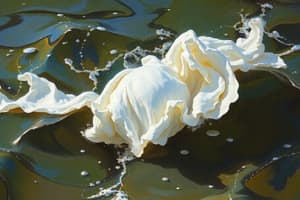Podcast
Questions and Answers
What does buoyancy refer to in materials?
What does buoyancy refer to in materials?
- The property to conduct heat well
- The capability to maintain a constant temperature
- The ability to change shape under pressure
- The ability to float in water (correct)
Which property is associated with the measure of matter in a given volume?
Which property is associated with the measure of matter in a given volume?
- Porosity
- Density (correct)
- Composition
- Buoyancy
What is meant by biodegradability?
What is meant by biodegradability?
- The property of being non-toxic
- The capability of materials to float
- The process of breaking down organic substances (correct)
- The ability to heal rapidly
How does temperature affect the decay process of materials?
How does temperature affect the decay process of materials?
Which of the following is a physical property of matter?
Which of the following is a physical property of matter?
What does ductility refer to in materials?
What does ductility refer to in materials?
Which property indicates how poisonous a substance can be?
Which property indicates how poisonous a substance can be?
What is brittleness in the context of materials?
What is brittleness in the context of materials?
What is the definition of corrosion?
What is the definition of corrosion?
Which of the following is considered a harmful material?
Which of the following is considered a harmful material?
What characteristic distinguishes a heterogeneous mixture?
What characteristic distinguishes a heterogeneous mixture?
Which type of mixture can only contain liquid components?
Which type of mixture can only contain liquid components?
Which of the following is an example of a naturally combined mixture?
Which of the following is an example of a naturally combined mixture?
Flashcards are hidden until you start studying
Study Notes
Buoyancy and Density
- Buoyancy refers to a material's ability to float in water, connected to density.
- Density is the measurement of mass in a specific volume of liquid.
Composition and Organic Matter
- Composition relates to how materials can break down into simpler forms.
- Organic matter from plants contributes nutrients back to the soil when decomposed.
Biodegradable vs. Non-Biodegradable
- Biodegradable materials decay and replenish nutrients in the soil.
- Non-biodegradable items can clog waterways, leading to floods and pollution.
Factors Influencing Decay Process
- Higher temperatures accelerate decay.
- Moisture presence enhances the activity of decomposers, speeding up decay.
- Exposure to elements can affect decay, as suggested by food covering practices.
Physical Properties of Matter
- Ductility: Solid materials can be drawn into wires.
- Porosity: Ability to retain liquids.
- Brittleness: Tendency to break into pieces.
- Elasticity: Capacity to return to original shape.
- Malleability: Ability to be hammered into sheets.
- Flexibility: Ability to bend without breaking.
- Magnetic: Ability to attract materials.
- Hardness: Resistance to pressure and scratching.
Chemical Properties of Matter
- Flammability: Capability of burning.
- Reactivity: Speed of reaction with other substances.
- Toxicity: Potential to cause poisoning.
- Corrosion: Tendency to be eroded by chemicals.
Useful Materials
- Wood: A renewable resource widely used in construction and furniture.
- Ceramics: Durable and heat-resistant, ideal for dishes and tiles.
Harmful Materials
- Pesticides: Contaminants harmful to humans and pets.
- Bleach: Skin and lung irritant, dangerous when mixed with other cleaners.
- Poisons: Substances that can lead to severe health issues upon exposure.
- Flammable Liquids: Easily ignitable and can result in explosions.
Mixtures and Their Characteristics
- Mixture: A combination of two or more substances in varying proportions.
- Examples include halo halo, soft drinks, coffee, and gas.
Forms of Mixtures
- Can be solid, liquid, or gas.
- Solid-Solid mixtures consist of only solid components.
- Liquid-Liquid mixtures contain only liquids.
- Nonreacting gas mixtures are composed of gases with fixed chemical compositions.
Types of Mixtures
- Heterogeneous: Mixtures with visibly distinct parts.
- Homogeneous: Mixtures where parts are not easily distinguishable.
Naturally Combined Mixtures
- Examples include beach sand and air mixed with clouds.
Studying That Suits You
Use AI to generate personalized quizzes and flashcards to suit your learning preferences.




